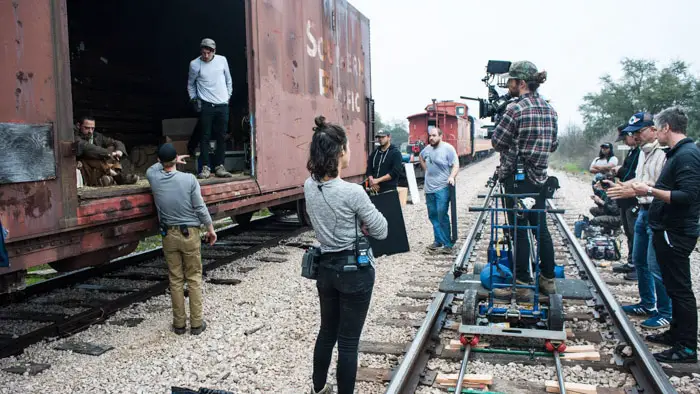
Oh! That makes sense. I’m in the middle of writing a screenplay right now, and it’s good to know how long it takes to do these things. There’s always an unrealistic expectation of how long things are supposed to take.
Well, I’ll tell you this, as someone who really backed into writing, I had it in my head for a long time that the great writers were just like Jack Kerouac, you know. A long scroll of paper and over the course of two weeks on amphetamines, you write your novel. But yeah, this project took me a year. I’d say, before this, I did something called The Intergalactic Nemesis. Each of those three scripts each took about a year to write. My next film project was on and off, almost a decade, working on this screenplay.
Oh wow!
Yeah, I couldn’t crack it. I’d put it aside and work on something else, then come back to it.
That’s really good to hear, and I think that people who will read this will find it to be good news that you can come back to something that you don’t just throw your ideas away forever.
Oh yeah, I have this file on my computer that’s like all my project ideas, which is continually a growing thing. Some of them I’ll go back to after years, and I’ll be like, “Wow, that’s a good idea,” and I might eventually pluck it out.

“I couldn’t crack it. I’d put it aside and work on something else, then come back to it.”
You said before that Down By Law and David Lynch’s early films influenced the film and you in general. Can you expand on that because I love all of these things?
I can tell from your review. One of the reasons I was looking forward to this interview is that you really understood where I was coming from in terms of making this movie. I think I just saw those movies at exactly the right time in my life. I was in my early 20’s and was making theater and did the stage version of this, Fugitive Pieces, back in the early 2000s and particularly drew from Jim Jarmusch. Both Stranger Than Paradise and Down By Law. In the stage version, I explored how silence could function on stage, which, also, I think another playwright who is influential in some way on Caridad’s work (Caridad Svitch is the author of the play) is Harold Pinter. The way Pinter worked, pauses become lines in his plays. There are rules written about the pauses and silences written into his scripts. I felt it was really interesting that Jim Jarmusch was doing similar things in his films. That really interested me, these characters staring at each other, the comedy that comes out of it. So in the play’s script, it is extremely dense with dialogue. If you were to play it straight through without taking a breath, you would have really overwhelmed the audience with an avalanche of words. You wouldn’t be able to follow it.
My solution to that problem was to break it up and turn these big long scenes into micro scenes and allow these silences. So, when I was adapting the stage play for the screen, I originally thought we had these pauses—still from Jarmusch—and what was interesting was, by breaking the scenes up and jettisoning a whole bunch of dialogue and reimagining for the screen. A lot of the pauses I thought for sure would be in there ended up not really having a place in the film. My film has plenty of stretches of silence, but they don’t function in the same way that Jarmusch’s do. So, that really isn’t answering your question at all, but it is part of the process that went into making the film. Then going back and thinking about making this movie. I feel like Jarmusch, David Lynch, Ingmar Bergman really came into my mind. I didn’t realize the effect that Fanny and Alexander had on me making this movie. How magic functions. Not the American cinematic version, but the original Swedish miniseries version.
Oh, of course.
Wim Wenders as well. You know how magic works in his films. I guess there’s magic in David Lynch. There’s magic in a less overt way. I feel like there’s so much magic in Down By Law. When they stumble upon that log cabin in the swamp, the beds are in the same configurations as a jail cell.

